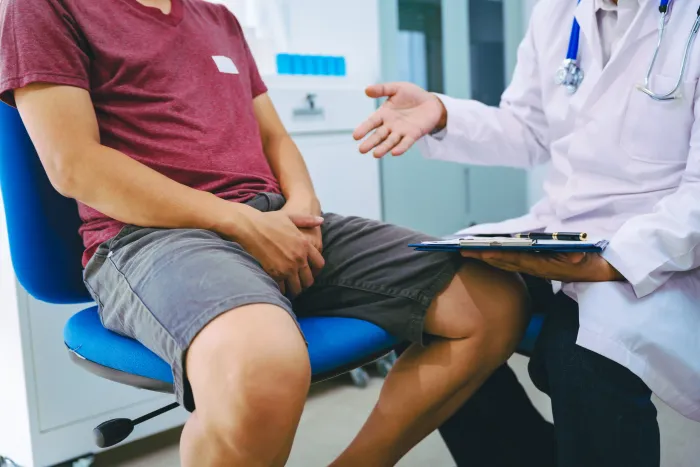Guide to An Enlarged Prostate Can Cause Trouble Urinating
Know about the prostate troubles, what it is, causes, risks, symptoms, diagnosis, treatment options, potential complications and how to live with prostate troubles and more.

Written by Dr. Dhankecha Mayank Dineshbhai
Reviewed by Dr. Rohinipriyanka Pondugula MBBS
Last updated on 13th Jan, 2026

Introduction
That feeling of urgency, only to stand at the toilet and produce a weak, hesitant stream. The frequent trips to the bathroom, especially throughout the night, disrupt your sleep. If this sounds familiar, you're not alone. These common urinary troubles are often the first signs of an enlarged prostate, a condition medically known as Benign Prostatic Hyperplasia (BPH). As a natural part of ageing for many men, the prostate gland grows and can begin to squeeze the urethra, the tube that carries urine out of the body.
This compression is the root cause of a host of frustrating and sometimes worrying symptoms. This guide will walk you through everything you need to know—from understanding why it happens and recognising all the symptoms, to exploring the latest diagnostic methods and effective treatment options. You'll learn how to manage this condition and reclaim your comfort and confidence.
What Exactly is an Enlarged Prostate (BPH)?
An enlarged prostate isn't a disease like cancer; it's a common, benign condition. The prostate is a walnut-sized gland located just below the bladder and in front of the rectum. Its primary function is to produce fluid that nourishes and transports sperm. For most men, the prostate continues to grow slowly throughout life. When this growth becomes excessive, it leads to BPH.
Consult a Top Urologist for Personalised Advice
The Prostate's Role and Why It Grows
The exact cause of BPH isn't fully understood, but it's closely linked to hormonal changes associated with ageing. As men get older, the levels of active testosterone decrease while estrogen levels remain steady. Another hormone, dihydrotestosterone (DHT), a powerful form of testosterone, is believed to accumulate in the prostate and stimulate its growth. It's not that the cells are abnormal; they are simply multiplying more than they should, leading to non-cancerous hyperplasia.
How BPH Directly Leads to Urinary Problems?
The problem arises from anatomy. The urethra runs directly through the centre of the prostate gland, like a straw
through a doughnut hole. As the prostate enlarges, it constricts this "straw," squeezing the urethra and partially blocking the flow of urine. This obstruction causes the bladder wall to become thicker and more muscular as it has to work harder to push urine out. Over time, the bladder may weaken and lose its ability to empty, leading to the hallmark symptoms of BPH: a weak urine stream, hesitancy, and dribbling.
Beyond the Dribble: Recognising the Full Range of Symptoms
The symptoms of BPH, often called Lower Urinary Tract Symptoms (LUTS), can vary widely from man to man. They are generally categorised into "obstructive" (related to blockage) and "irritative" (related to bladder changes).
Common Urinary Symptoms You Shouldn't Ignore
It includes:
- Weak or Intermittent Stream: The flow of urine is weak, stops and starts, or lacks force.
- Hesitancy: Difficulty starting urination, often requiring you to wait or strain.
- Dribbling at the End: Leaking or dribbling urine after you think you've finished.
- Incomplete Emptying: A persistent feeling that your bladder isn't fully empty.
- Frequency: Needing to urinate more often than every two hours.
- Urgency: A sudden, strong, and sometimes uncontrollable need to urinate.
- Nocturia: Waking up two or more times per night to urinate, a major disruptor of sleep quality.
Less Common but Serious Signs
While BPH is benign, its effects can sometimes lead to more serious complications. Seek immediate medical attention if you experience:
- Complete Inability to Urinate (Acute Urinary Retention): This is a painful medical emergency.
- Blood in the Urine (Hematuria): While it can be caused by a straining bladder, it needs investigation.
- Painful Urination: This could indicate a urinary tract infection.
- Recurrent UTIs or Bladder Stones: Caused by urine that is not fully emptied from the bladder.
If you are experiencing any of these more severe symptoms of an enlarged prostate, it is crucial to consult a healthcare professional for a proper evaluation. If your condition does not improve after trying lifestyle methods, book a physical visit to a doctor with Apollo24|7 for a comprehensive diagnosis.
Understanding the Causes and Risk Factors
These include:
The Primary Driver: Ageing and Hormones
Age is the most significant risk factor for developing an enlarged prostate. It's rare in men under 40, but by age 60, over 50% of men have some signs of BPH. By age 85, that number rises to about 90%. The hormonal shifts mentioned earlier are the primary engine behind this age-related growth.
Other Factors That Can Increase Your Risk
- Family History: Having a blood relative (father or brother) with BPH increases your own risk.
- Ethnicity: Research suggests BPH may be more prevalent and progress more rapidly in Black men, while Asian men may have a lower risk.
- Medical Conditions: Obesity, heart disease, and type 2 diabetes are linked to a higher risk of BPH and worse symptoms. Metabolic syndrome appears to be a significant contributor.
- Lifestyle: A lack of physical activity and a diet high in red meat and fat and low in vegetables may play a role, though more research is needed.
Getting a Diagnosis: What to Expect at the Doctor's Office
Diagnosing BPH is a straightforward process designed to rule out other conditions, like prostate cancer or infections, and assess the severity of your symptoms.
The Initial Conversation: Your Symptom History
Your doctor will likely use a standardised questionnaire like the International Prostate Symptom Score (IPSS) to
quantify your urinary troubles. Be prepared to answer questions about frequency, nocturia, urgency, and the strength of your stream.
Key Physical Exams and Tests
The Digital Rectal Exam (DRE)
This quick exam allows the doctor to feel the size, shape, and texture of your prostate gland through the rectal wall. It's a crucial first step.
The PSA Blood Test
The Prostate-Specific Antigen test measures the level of PSA, a protein produced by the prostate. While elevated PSA can be a sign of BPH, it is also used to screen for prostate cancer. Your doctor will interpret the result in context.
Urine Flow Study and Post-Void Residual Measurement
These tests measure how quickly urine flows and how much is left in your bladder after you urinate, providing objective data on obstruction.
Based on these initial findings, further tests like an ultrasound or cystoscopy may be recommended. Apollo24|7 offers convenient home collection for tests like PSA, ensuring a hassle-free start to your diagnostic journey.
Finding Relief: Effective Treatment Options for BPH
Treatment is highly personalised and depends on the severity of your symptoms. The approach is typically stepped, from least to most invasive.
Lifestyle Modifications and Natural Remedies
For mild symptoms, these changes can make a significant difference:
- Bladder Training: Schedule urination times and gradually increase the intervals between them.
- Dietary Adjustments: Reduce caffeine and alcohol, especially in the evening, as they can irritate the bladder and increase urine production.
- Fluid Management: Spread fluid intake throughout the day and limit drinks a few hours before bedtime.
- Double Voiding: Urinate, wait a moment, and try again to empty your bladder more completely.
Medications to Relax or Shrink the Prostate
Alpha-Blockers (e.g., Tamsulosin): These relax the muscles of the prostate and bladder neck to improve urine flow
quickly. They are excellent for relieving symptoms, but don't shrink the prostate.
5-Alpha Reductase Inhibitors (e.g., Finasteride): These drugs slowly shrink the prostate gland by blocking the
production of DHT. They are better for very large prostates, but take months to work and can have sexual side effects.
Minimally Invasive Procedures (MISTs)
When medications aren't enough or cause side effects, MISTs offer a middle ground with less risk than major surgery. Examples include Rezūm (water vapour therapy) and UroLift (implants that hold the prostate open). These minimally invasive prostate surgery options often preserve sexual function.
Surgical Options for Severe Cases
For severe BPH or complications, surgery is the gold standard. Transurethral Resection of the Prostate (TURP) is the most common procedure, where a surgeon trims away excess prostate tissue to widen the urethra.
Potential Complications if Left Untreated
Ignoring significant BPH symptoms can lead to:
- Acute Urinary Retention: A sudden and painful inability to urinate, requiring catheterisation.
- Urinary Tract Infections (UTIs): Incomplete emptying allows bacteria to grow.
- Bladder Stones: Crystallised minerals that form in stagnant urine.
- Bladder Damage: The overworked bladder muscle can become weak and scarred.
- Kidney Damage: In rare cases, back-pressure from the blocked bladder can harm the kidneys.
Living Well with BPH: Daily Management Tips
Managing BPH is a long-term endeavour. Beyond medical treatments, focus on a healthy lifestyle: maintain a healthy weight, exercise regularly (Kegel exercises can help), manage stress, and avoid medications that can worsen symptoms, such as over-the-counter decongestants. If symptoms persist beyond two weeks of self-management, consult a doctor online with Apollo24|7 for further evaluation and personalised advice.
Conclusion
Dealing with the urinary troubles of an enlarged prostate can be frustrating and impact your quality of life. However, it's important to remember that BPH is a highly manageable condition. You don't have to accept these symptoms as an inevitable part of ageing. By understanding the causes, recognising the signs, and seeking a professional diagnosis, you open the door to a wide range of effective treatments. From simple lifestyle adjustments to advanced minimally invasive procedures, there are solutions to help you regain control, sleep through the night, and enjoy life without constant worry about the nearest bathroom. Take the first step today by talking to a healthcare provider about your symptoms.
Consult a Top Urologist for Personalised Advice
Consult a Top Urologist for Personalised Advice

Dr. Amvrin Chatterjee
Urologist
10 Years • MBBS, MS, DNB, MCh
Kolkata
Apollo Multispeciality Hospitals , Kolkata, Kolkata

Dr. Gaurab Dasgupta
Urologist
14 Years • MBBS, MS General Surgery, MCH Urology, FMAS
Kolkata
MCR SUPER SPECIALITY POLY CLINIC & PATHOLOGY, Kolkata

Dr Shailendra Kumar Gupta
Urologist
10 Years • MBBS, MS (KGMU), DNB (Urology - MPUH, Nadiad)
Lucknow
Apollomedics Super Speciality Hospital, Lucknow

Dr Ram Prasad Ch
Urologist
6 Years • MBBS MS(Gen Surgery) DrNB(Urology)
Hyderabad
Apollo Hospitals Jubilee Hills, Hyderabad

Dr. Manoj Kumar Singh
Urologist
18 Years • MBBS , MS (General Surgery), MCh. (Urology (Gold Medalist)
Guwahati
Apollo Excelcare Hospital, Guwahati
(25+ Patients)
Consult a Top Urologist for Personalised Advice

Dr. Amvrin Chatterjee
Urologist
10 Years • MBBS, MS, DNB, MCh
Kolkata
Apollo Multispeciality Hospitals , Kolkata, Kolkata

Dr. Gaurab Dasgupta
Urologist
14 Years • MBBS, MS General Surgery, MCH Urology, FMAS
Kolkata
MCR SUPER SPECIALITY POLY CLINIC & PATHOLOGY, Kolkata

Dr Shailendra Kumar Gupta
Urologist
10 Years • MBBS, MS (KGMU), DNB (Urology - MPUH, Nadiad)
Lucknow
Apollomedics Super Speciality Hospital, Lucknow

Dr Ram Prasad Ch
Urologist
6 Years • MBBS MS(Gen Surgery) DrNB(Urology)
Hyderabad
Apollo Hospitals Jubilee Hills, Hyderabad

Dr. Manoj Kumar Singh
Urologist
18 Years • MBBS , MS (General Surgery), MCh. (Urology (Gold Medalist)
Guwahati
Apollo Excelcare Hospital, Guwahati
(25+ Patients)
More articles from Enlarged Prostate
Frequently Asked Questions
1. Can an enlarged prostate affect sexual function?
BPH itself does not directly cause erectile dysfunction. However, some medications used to treat BPH (specifically 5-alpha reductase inhibitors) can have side effects like reduced libido or erectile difficulties. Many treatments, especially MISTs like UroLift, are chosen specifically to preserve sexual function.
2. Are there any proven natural remedies to shrink the prostate?
While no natural remedy can dramatically 'shrink' the prostate, some supplements may help alleviate symptoms of an enlarged prostate in men. Saw Palmetto is the most studied, though evidence of its efficacy is mixed. Other options like beta-sitosterol, pygeum, and rye pollen extract have shown some promise in relieving symptoms. Always consult your doctor before starting any supplement, as they can interact with medications.
3. What's the difference between BPH and prostate cancer?
BPH is a benign (non-cancerous) growth of prostate cells. Prostate cancer is a malignant growth. They can cause similar symptoms, but they are entirely different diseases. Having BPH does not mean you have cancer, nor does it increase your risk of getting cancer. However, they can coexist, which is why proper diagnostic testing is essential.
4. How can I tell if my trouble urinating is just BPH or something else?
While BPH is a common cause, other conditions like urinary tract infections, prostatitis (inflammation of the prostate), or neurological issues can cause similar symptoms. This is why a doctor's evaluation is critical to get the right diagnosis. A frequent urination at night could be BPH, but it could also be related to other health issues.
5. When should I go to the emergency room for BPH symptoms?
You should seek immediate emergency care if you experience a complete inability to urinate despite a full bladder (acute urinary retention), which is often accompanied by severe lower abdominal pain. This is a urological emergency.


.webp)